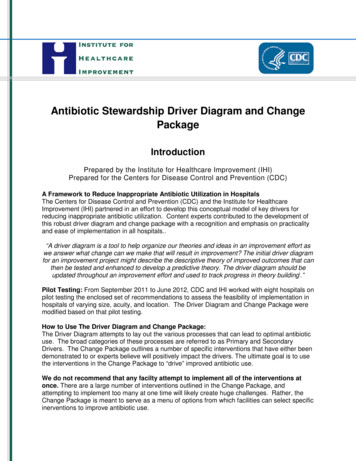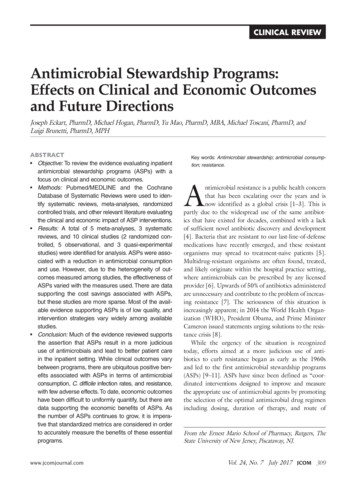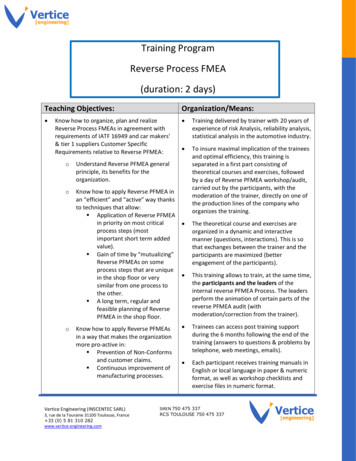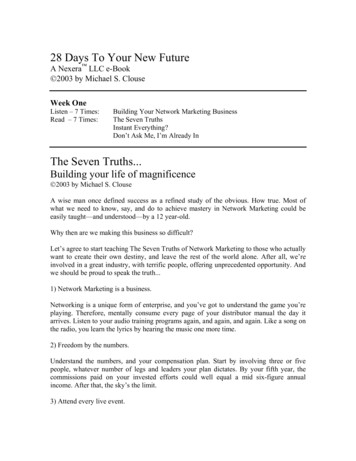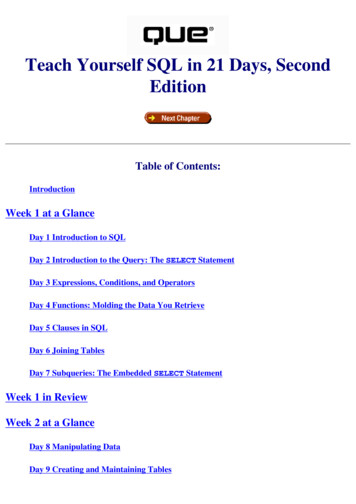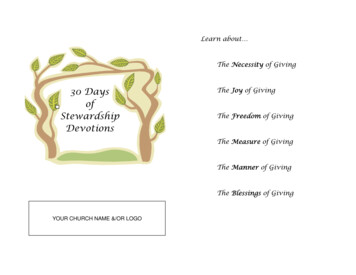
Transcription
Learn about The Necessity of Giving30 DaysofStewardshipDevotionsThe Joy of GivingThe Freedom of GivingThe Measure of GivingThe Manner of GivingThe Blessings of GivingYOUR CHURCH NAME &/OR LOGO
The Necessity of GivingIntroductionDay 1“Honor the Lord with your wealth, withthe firstfruits of all your crops.”---Proverbs 3:9 Are you a cheerful giver? Do you know what it means to give freely? Have you asked God lately how much He wants you to give?Leftovers. They are a wonderful timesaver in the kitchen andPeriodically it is good for us to re-examine our giving; to ask ourselvesIf we are giving out of habit or if we are seeking and following God’s direction insometimes even seem to taste better than the original meal. But whenwe honor someone with a meal, we would never think of using leftovers.the area of our life that deals with giving back.This devotional is intended to help us do that.The same is true when it comes to the way we worship andhonor our King, the Lord Jesus Christ. If we truly want to honor Him, itwill not be with our “leftovers”. Everything we have, everything we are,We encourage you to use this devotional for the next thirty days. Think aboutand everything we hope for are rooted in God’s creation of us and Histhe Bible verses that the devotionals are based on. Apply the devotionals tograciousness toward us through Christ. Our time, money, and abilitiesyour own unique situation. Talk about them with your children. And pray. Prayare actually His. We should not give Him our time, money or abilities “ifthat God will reveal to you how you need to respond to these biblicalthere is some leftover”. We only honor God when we give to Him first,instructions.trusting that He will provide for the rest of our time, money, and energyneeds.The devotional topics are:The Necessity of GivingThe Joy of GivingThe Freedom of GivingProverbs 3:9 urges us to honor God by practicing firstfruit givingwith our money. We basically have five general alternatives when itcomes to what we do with our income: (1) the support of a chosenThe Measure of Givinglifestyle; (2) whatever is needed for the repayment of debt because ofThe Manner of Givingthat lifestyle; (3) the payment of taxes; (4) what we save and invest forThe Blessings of Givingthe future; and (5) what we give away. What order of priority do thesefive alternatives take in your life? Does Proverbs 3:9 make a differencein helping you determine those priorities?We would like to thank the Pastors, Elders, and Deacons of Sunshine CommunityChurch of Grand Rapids, MI, for contributing to the creation of this devotional andallowing us to share it with your church.
The Necessity of GivingDay 2The Necessity of GivingDay 3“But just as you excel in everything—in faith,in speech, in knowledge, in complete earnestnessand in your love for us—see that you also excelin this grace of giving.”--2 Corinthians 8:7“A tithe of everything from the land, whethergrain from the soil or fruit from the trees,belongs to the Lord; it is holy to the Lord.”--Leviticus 27:30This verse appears in a section of Leviticus dealing with the rulesPaul loved the church in Corinth as a parent loves a child. Heregarding making promises to God. An Israelite would promise a servant,witnessed the outpouring of God’s gifts upon the whole believingan animal, a house or some land to God as an expression of gratitude andcommunity.thankfulness to Him. Hannah, for example, dedicated her son, the prophettestimony, knowledge, faith, and spiritual gifts that continued to enrichSamuel, out of gratefulness to God for answering her prayers.the community. It seems they lacked nothing. Even in the area ofOnce a person devoted something to God, it became the Lord’spossession. The Hebrew wording speaks to the “irrevocable giving over ofThey had been given salvation in Christ, an articulatematerial and physical needs, the Corinthian community was verycomfortable.things or persons to the Lord”. It was His and He could do with it as HeYet, just as any loving and committed parent would, Paulpleased. Furthermore, the Lord declared it holy—sanctified, set apart forcontinued to lead, teach, and advise the community at Corinth. In hisspecial use, consecrated for service.Paul tells us in I Corinthians 6:19-20, “ You are not your own; youwere bought at a price”. Because of Christ’s sacrifice for us, we are nowthe Lord’s possession. All that we are and all that we have are irrevocablyHis.In I Peter 2:9, Peter writes, “But you are a chosen people, a royalpriesthood, a holy nation, a people belonging to God that you may declarethe praises of Him who called you out of darkness into His wonderful light”.Like the dedicated things of Leviticus, we not only belong to the Lord, butsecond letter to the church, Paul encourages the believers to identifythemselves with the greater ministry of the early Christian church. Paulrecognizes their past support and yet admonishes them to continue tosupport the ministry going on in Jerusalem. He encourages them thattheir practice of generosity should match the same standard ofexcellence they demonstrate in other areas of their walk with Jesus.Specifically, they should count God as the owner of all they possess andgive from that posture.we are also holy, set apart and consecrated for His use. We are His and allAn individual who does not truly count God as the owner of allthat we have is His. As we give ourselves and give of what we have to thisthey have can never be truly generous. Generosity flows from a posturereality, we declare the praise of the One who has called us His own.that sees everything as owned by God.possessions, and wealth?Who owns your life,
The Necessity of GivingDay 4“If anyone has material possession and sees his brother inneed but has not pity on him, how can the love of God bein him? Dear children, let us not love with words or tonguebut with actions and in truth.”--I John 3:17In the verse preceding this text, John writes, “This is how we knowThe Necessity of GivingDay 5“So if you have not been trustworthy in handling worldlywealth, who will trust you with true riches?--Luke 16:11Jesus clearly teaches that how we handle our worldly wealthdirectly relates to the quality of our spiritual life. The responsible use ofwhat love is: Jesus Christ laid down his life for us. And we ought to layour material wealth gauges our fitness to receive “true riches”. This isdown our lives for our brothers”. What does it mean to “lay your life down”true both for us as individuals and for us as a church. We are called tofor your brothers? Does this mean we are to literally die for them?be trustworthy in worldly things while seeking the true riches of things ofVerses 17 and 18 offer two practical ways to lay down our lives forour brothers. First, if we have material possessions, we are to give to ourbrothers who are in need. Secondly, we are to love not only with words, butthe Spirit.While being faithful in the natural, we must live in theconstant reality of the supernatural.Have you been praying for revival?deeper fellowship with Christ?with actions and in truth.Are you yearning for aHave you been longing for theWe could give people our excess in material goods and try to bemanifestation of all the gifts of the Spirit in our fellowship? Do you wishhelpful, but we would be in danger of not showing true love. True lovefor more evidence of the fruit of the Spirit in our midst—love, joy, peace,means actions that stem from a heart of conviction, a heart ofpatience, kindness, goodness, gentleness, self-control? Will the Lordcommitment—a heart filled with the love of God.entrust these “true riches” to us at our present level of faithfulness?This kind of heartcondition only comes when we lay our lives before the cross of Jesus andDear friends, I pray we will walk together in the fullness of thesay, “All that I am and all that I have are yours, Lord. Show me who youkingdom, faithful in worldly things while experiencing the unspeakablewant me to love and minister to today”. This takes the focus off you andjoy of true riches of the Spirit!puts it on God.Meditate on how you can lay down your life for your brothers withinour church.“But seek first His kingdom and His righteousness, andall these things will be given to you as well.”--Matthew 6:33
The Joy of GivingDay 6The Joy of GivingDay 7“The people rejoiced at the willing response of their leaders,for they had given freely and wholeheartedly to the Lord.David the king also rejoiced greatly.”--I Chronicles 29:9“Each man should give what he hasin his heart to give, not reluctantly decided or undercompulsion, for God loves a cheerful giver.”--2 Corinthians 9:7This chapter of Chronicles records the pledge drive and fund-raisingGiving to the causes of God’s Kingdom is always a matter of theefforts for the building of the temple of Solomon to the Lord. King Davidheart and is between the believer and God. God desires a right attitude,not for us to feel coerced into giving.provided all the resources from the public treasuring of the building. Healso pledged incredible wealth from his personal treasures to the Temple.His model of generosity inspired families, leaders, commanders andPaul demonstrates two principles of giving in this verse. First,officials of the people of Israel to “give willingly” of all they had to thewhat a person gives should be deliberate, a matter of thought andTemple fund. The people rejoiced at the demonstration of giving to theplanning. A gift given on impulse may be regretted at a later time. OneLord, recognizing that all gifts originated with God and, therefore, belong tomight regret that he has committed too much and cannot keep hisGod.pledge. On the other hand, had the giver planned properly, he mightThis chronicle of God’s people illustrates many important themes infind he could have given more. Deliberate planning will be helpful inChristian giving.deciding how liberal we should be in our gifts. Secondly, the gift shouldaccident.be given freely, not grudgingly or out of necessity.Any manner ofwholeheartedly” and not out of half-interested obligation or guilt. Thirdly,unwillingness spoils the act of giving. We should give cheerfully, beingthe giving was done in praise to God with humble acknowledgement that allglad we have the ability and an opportunity to give.gifts are of God. The central theme inWe are objects of God’s divine love and his unmerited favor. Wewill never lose by doing that which pleases God. The love and favor ofGod is better than anything—even life itself.First, the giving was deliberate, not by spontaneousSecondly, the giving was done “willingly, freely andI Chronicles.29 is that the people rejoiced at the response of givingdemonstrated by the leaders. This, in turn, caused David to rejoice.David’s example motivated the others to give because giving isinfectious. Those who lead us must model giving and we, in turn, mustprovide the example to those we lead. This theme requires application inour churches and in our homes. If we, as leaders in our church, our home,and in the community, hope to praise God through giving, we must first stepout by modeling giving, demonstrating our heart of thanks to the Lord.
The Joy of GivingDay 8“All the officials and all the people broughttheir contributions gladly, dropping theminto the chest until it was full.”--2 Chronicles 24:10Joash reigned for 40 years over Judah.One of the centralThe Freedom of GivingDay 9“Then Hezekiah said, ‘You have now dedicatedyourselves to the Lord. Come and bring sacrifices and thankofferings to the temple of the Lord.’ So the assembly broughtsacrifices and thank offerings, and all whose hearts werewilling brought burnt offerings.”--2 Chronicles 29:31accomplishments of Joash’s rule was the reconstruction of the temple inJerusalem. Joash had a heart to see God’s house rebuilt and so hechallenged the people of Judah to give sacrificially to its repair.And the people of God really responded. They gave gladly andmore than enough money was raised to not only reconstruct the temple,but also to replace the articles of worship within the temple.This is a good example of an Old Testament praise gatheringhappening near the house of the Lord. All the people—rulers, officials,and common folk—gave their gifts gladly and rejoiced.What is the condition of our heart when we, as Christians, giveour gifts to the Lord? Do we rejoice and thank God for all He has donefor us? Or, do we give our gifts because it’s expected? Does God getthe money leftover after we pay for groceries, bills, and fun money? Or,because of our circumstances, do we think we cannot give at all?Examine your heart right now and search for your true motivationfor giving. Remember, the Lord loves a cheerful heart when giving toHis Kingdom’s work.In the previous verses, King Hezekiah leads the people into aprocess of cleansing and sanctification because of their disobedience.They accomplished this by both physically and spiritually removing the“filth” from the temple as well as from their own lives. Only after thisprocess was completed were the priests and Israelites ready to presenttheir sacrifice and thank offerings to the Lord.This procedure isnecessary for each of us as well. At that point, we become ready topresent our offerings to God in complete freedom and with a clean heartand mind.These particular offerings were not part of a legalistic mandate.The people gave from the heart out of their own free will. Hezekiah’sappeal is so effective that “the priests were too few and could not skinall the burnt offerings ” (vs. 34a) When the people were confrontedwith their need for personal sacrifice, the response was overwhelming.They gave generously, sacrificially, and cheerfully.After their relationship with God had been restored, “Hezekiahand all the people rejoiced because of what God had done for thepeople ” (vs. 36a). Each of us have a similar opportunity to worshipGod with our sacrifices from the heart. Only then will true rejoicing andrenewal take place.
The Freedom of GivingDay 10The Measure of GivingDay 11“Freely you have received, freely give.”--Matthew 10:8“On the first day of every week, each one of youshould set aside a sum of money in keeping withhis income, saving it up, so that when I comeno collections will have to be made.”--I Corinthians 16:2Jesus just completed an extensive course in basic training withHis disciples. He called them, prepared them, trained and showed themthe ropes. As a commanding officer gives final instructions to jitteryyoung soldiers preparing for a military strike, Jesus informs the disciplesof the battle plan.He provides detailed instructions, warns them ofpitfalls and hardships to come and, finally, Jesus offers encouragement.In his letter to the Corinthians, Paul emphasizes the need to bepurposeful in routinely and systematically saving for God’s work. Heasks that each one in the church of Corinth set aside a sum of moneyWe are reminded in this text of all that God has given us in Christ.the first day of the week for later distribution to the church in Jerusalem.He has lavishly poured out His grace upon us, redeeming us, calling usBy taking this approach (instead of making a massive effort at the lastas His own, giving us new life with Him. Ephesians 1 tells us that weminute), Paul made it easier for the church to achieve its goals.have truly been blessed with every sort of spiritual blessing. We havereceived all this freely.God is the source of everything we have—our time, our talents,and our finances, enabling us to give to others in His name, so that“they may see your good deeds and praise your Father in heaven”.(Matthew 5:16)Paul also wanted the church in Corinth to be proactive in theirgiving.Their earnest desire to contribute to God’s work would bedemonstrated by setting aside a sum of money before he arrived notafter.Finally, Paul was giving a personal challenge to each believer.He asked each individual to examine their income and give accordingly.What has God given you that you could freely give? Is it time?In the same way, Christ challenges us not only to give our money, butDo you find yourself with “free” time on your hands that could be used inalso our time and talents. We can examine the gifts God has given usHis Kingdom? Has God gifted you with a particular skill or trade thatand give back in a purposeful, proactive, and personal way.could be used at our church? Has God blessed you financially? Couldyou free up some funds to extend His Kingdom? Take a moment andreflect on how God has give you the undeserved gift of grace throughHis Son, Jesus Christ. Now reread Matthew 10:8.
The Measure of GivingDay 12“For I testify that they gave as much as they were able,and even beyond their ability.Entirely on their own, they urgently pleaded withus for the privilege of sharing in this service to the saints.”--2 Corinthians 8:3-4Have we, as contemporary Christians, ever come as close to thelevel of devotion and generosity as these verses model for us? Paul writesthat these believers “gave as much as they were able and even beyondtheir ability.” These believers clearly gave out of their poverty—not out oftheir affluence.Typically, we say we give “what we can afford”. That oftenmeans we donate whatever we can spare without cramping our lifestyle.We fit God into the budget after much of the other stuff is afforded. Butthese Christians saw things differently; they gave more than they wereobligated to give. Verse 4 implies they not only “gave beyond theirability” but also “pleaded for the privilege of sharing in this service tothe saints”.These believers gave beyond their means. Perhaps they evenbudgeted some things differently in order to give more than they wereordinarily able to do. Their attitude was that it was a privilege to share inGod’s work. If we find that concept too difficult to understand, perhaps itis because we are giving incorrectly. These Christians “gave themselvesfirst” and “then they gave to others in keeping with God’s will”. When wegive our gifts to God, it should be a reflection of the fact that we havealready given ourselves to God.Prior consecration means that to give our gifts to God, withoutgiving ourselves to Him, is not to do it God’s way. God is not anxious forour money; He desires our love. If we are truly devoted to Christ, givingour gifts to Him will simply be a reflection of our prior consecration.You can give without loving, but you can’t love without giving.What motivates us to give to the Lord? Are we consecrated toHim? If we are, giving our gifts will come naturally. Perhaps then we willsee our giving to the Lord as a privilege and follow the example of thebelievers in 2 Corinthians 8:3-5.The Measure of GivingDay 13“As soon as the order went out, the Israelitesgenerously gave the firstfruits of their grain, new wine,oil and honey and all that the fields produced.They bought a great amount, a tithe of everything.”--2 Chronicles 31:5Several places throughout the Bible, God encourages us to givethe first fruits of our “crops” (income). Why did God specify the firstfruits—not the middle portion, not the last portion, no the leftovers—butthe first fruits? While it is true that God called the children of Israel tooffer the choicest and best of what they had to Him; could it be that theissue God was addressing was more about our trust than about money?Would it really matter which portion you gave if it was the exact sameamount? Probably not, but the issue is really not about giving as muchas it is about trusting God.Giving the first fruits requires greater trust than at any other time.Do we believe God will truly supply all our needs, including our finances,if we freely give a tithe of our first fruits?The Bible clearly states,“Blessed is he who trusts in the Lord.” (Prov.16:20).A close walk with the Lord requires us to put our complete trustin Him, including areas of our life where we are prone to forget whoreally owns it all. We can be assured that “God will meet all our needsaccording to His glorious riches in Christ Jesus.” (Phil 4:19) Remember,“Honor the Lord with your wealth, with the firstfruitsof all your crops; then your barn will be filled to overflowing, andyour vats will brim over with new wine.” (Proverbs 3:9-10)
The Manner of Giving: FreelyDay 14“And here is my advice about what is best for you in this matter: Lastyear you were the first not only to give, but also to have the desire to doso. Now finish the work, so that your eager willingness to do it may bematched by your completion of it, according to your means. For if thewillingness is there, the gift is acceptable according to what one has, notaccording to what he does not have.”--2 Corinthians 8:10-13After church, a family was discussing the service over Sundaydinner. Dad commented on how badly the organist sounded. Mom saidthe choir wasn’t prepared. Nancy complained the preacher was boring.The Manner of Giving: GenerouslyDay 15“Command them to do good, to be rich ingood deeds, and to be generous and willing to share.”--I Timothy 6:18Generosity never stands alone.It is always associated with othertraits. It is a symptom, not an independent entity.Find a generous person and you will find contentment, gratitude,humility, love, and compassion.The person cannot help but be generousbecause everything he is and has is tied up in relation to God. The generousperson, for example, might be so thankful for the family van that a naturalJack listened thoughtfully for a moment, and then he said, “It wasn’t thatexpression of their stewardship would be loaning it to the youth group for abad of a show for a buck.”weekend outing.Paul was complementing the church in Corinth on their attitudeContentment is a key factor to generosity. It walks hand-in-hand withtoward giving, not just on the act or amount of their giving. In thegratitude because only when a person no longer desires for self is generosityprevious verses, Paul said he was testing the sincerity of their love byperfected. Maybe that’s why Paul is speaking to the rich in this passage. In thetheir desire to give. Likewise, our love is tested by our willingness topreceding verse, Paul instructs Timothy, “Command those who are rich in thisoffer our prayers, funds, time, and talents.He points out two very important points in this passage. Givingis an important part of Christian discipleship—the completion of this actis important. But equally important is the willingness and desire to do so.As with most issues in the Christian life, attitudes are as important asactions.Our attitude toward giving reveals our values and the sincerity ofpresent world not to be arrogant nor to put their hope in wealth, which is souncertain, but to put their hope in God, who richly provides us with everythingfor our enjoyment.” The product of arrogance and trusting in riches is to hoardwealth and continue to be greedy. It’s so easy to want more and more, isn’t it?That’s why Paul commands the rich to adjust their behavior and elevate theirmotives because greed, to any degree, closes the door to generosity.Many years ago, I wrote “A Page of Priorities” at the top of the page inmy Bible where I Timothy 6 appears. I encourage all of us to be content andour love for others and God. If you need a change in attitude, ask Godgrateful.to fill your heart and motivate you to give in love.contentment, and love. Let’s take hold of life that is truly life!May generosity overflow from our cup of humility, gratitude,
The Manner of Giving: SacrificiallyDay 16The Manner of Giving: WillinglyDay 17“As he looked up, Jesus saw the rich putting their giftsinto the temple treasury. He also saw a poor widow put intwo very small copper coins. ‘I tell you the truth,’ he said, ‘thispoor widow has put in more than all the others. All these people gave their giftsout of their wealth; but she out of her povertyput in all she had to live on.” –Luke 21:1-4“For if the willingness is there, the gift is acceptableaccording to what one has, not according towhat he does not have.”--2 Corinthians 8:12Many people see tithing as a requirement—the “Christian thing toSacrifice. Does the word conjure up an image of a lamb ora goat being slain and offered on an Old Testament altar? Or do you seedo.” Paul, however, begins with “if the willingness is there ” and notJesus on the cross—the ultimate sacrifice of all time? Do you think of the time“this must be done.” Mark 12:41-44 relates the story of the widow’syou gave up that fishing trip to take your wife to the Mall of America? Or do youoffering. “Jesus said, ‘I tell you the truth, this poor widow has put moreremember the time you passed up lunch with a friend to accompany 30 firstgraders on an all-day field trip?Sacrifice hits us where we live. Whether it be time, service, assets, ormoney, it requires us to give up something we hold dear. Why is sacrificeinto the treasury than all the others.’” Jesus’ emphasis on the widow’swillingness to give all she had despite her poverty indicates to us it wasthe desire of the widow to give, not the amount of the gift that’sdifficult? We are prone to an attitude of entitlement. Our society encouragesimportant to God. Ananias, in Acts 5, had much more to give financially,individualism and success, often at the expense of others.The first stepbut withheld part to keep for himself. He was not judged on his gift, butin becoming a truly sacrificial giver is to recognize that all we have comes fromrather on the deceit in his heart. As Christians, we should model theGod and belongs to Him. Without Him, we would have nothing. A second stepwillingness in our hearts to share what God has so generously given toto being able to give as this widow did, is overcoming our fear of not being ableus.to provide for ourselves and our loved ones.Giving beyond our means,Asking God for “extra” money to share bypasses the point ofhowever, is not to be confused with living beyond our means. As seen in thiswillingness. Our prayer, rather, should center on the words of David inexample and in the example of the widow who provided for Elijah and never ranout of flour and oil, when we give all we have back to God, He will provide forus beyond our wildest imagination.Let’s take God at His word. We’ve seen how He blesses those whogive from a heart that recognizes the great sacrifice God made for us and thatwe can trust Him enough to provide all we need. Can we love and trust Himthat much?Psalm 51, “Have mercy on me, O God, according to your unfailinglove Create in me a pure heart, O God, and renew a steadfast spiritwithin me.” (Psalm 51:1,10)A pure heart and steadfast spirit will lead to the willingness togive, without the worry of how much.
The Manner of Giving: FreelyDay 18“Freely you have received, freely give.”--Matthew 10:8I’m amazed at all You’ve done for meWho am I that You’d bless me so—I stand in awe of all Your wondrous deedsYou’ve dealt with me so graciously.The words of this song touch my heart. They remind me ofGod’s love for me, demonstrated in the ultimate sacrifice of Christ’sdeath for my salvation. Nothing I could do or say could ever pay thedebt I owe to God for my sin. God knew His gracious gift of His Son,Jesus, was the only way for me to live. It is truly amazing!Although God has given His children many gifts—both spiritualand material—we did not deserve them and should not selfishly hoardthem. When Jesus told His disciples to go out and freely give, He wasspecifically referring to the spiritual gifts they had received—to preach,teach and heal in Jesus’ name. They were called by Jesus to freelygive and share these gifts with the lost people they encountered.The command for us is no less. We should not selfishly claimthe spiritual or material gifts God has so freely given us. Jesus callseach of us to examine our hearts and realize the amazing sacrifice ofJesus and the awesome gifts God has freely given us. Our responsecan be none other than to willingly give of all that we have and are. Goddid not limit His love and gifts to us. We, therefore, cannot place limitson our giving.The Manner of Giving: CompassionatelyDay 19“He went to him and bandaged his wounds,pouring on oil and wine. Then he put the man on his owndonkey, took him to an inn, and took care of him.The next day he took out two silver coins and gave them to theInnkeeper; ‘Look after him,’ he said, ‘and when I return, I will reimburse you forany extra expense you may have.”--Luke 10:34-35An “expert” in Jewish law came to Jesus and questioned Himabout what he should do to inherit eternal life. When Jesus told him tolove God above all and his neighbor as himself, the “expert” challengedJesus on who his neighbor was. He hoped to be given a list of peoplehe had to treat right, but Jesus doesn’t let him off so easily.In response, Jesus relates to him the story of a Samaritan whonot only stops to care for the injured man, but also pays his expenses.Jesus is telling the “expert” of the law that our neighbors are everyonearound us since Jews would never have considered the Samaritanstheir neighbors and vice versa.The Samaritan’s response shows us that Jesus calls us to giveourselves away to other people. That is what it means to be a neighbor.We put others’ needs ahead of our own. (Phil. 2:1-4) Jesus shows twoways to help others. First, the Samaritan gave his time to help theinjured man. Secondly, he used his personal finances to help thisstranger. Generosity is not easy; there is a personal cost in giving ofourselves.How about you? Are you ready to met the challenges that Jesusgave the expert in the law? Are you ready to be the kind of neighborwho gives of him/herself in both your time and finances? Where will yoube involved in giving yourself away?
The Manner of Giving: LovinglyDay 20“If I give all I possess to the poor and surrender mybody to the flames, but have not love, I gain nothing.”--I Corinthians 13:3The Blessing of GivingDay 21“One
Have you asked God lately how much He wants you to give? Periodically it is good for us to re-examine our giving; to ask ourselves If we are giving out of habit or if we are seeking and following God’s direction in the area of our life that deals with giv


